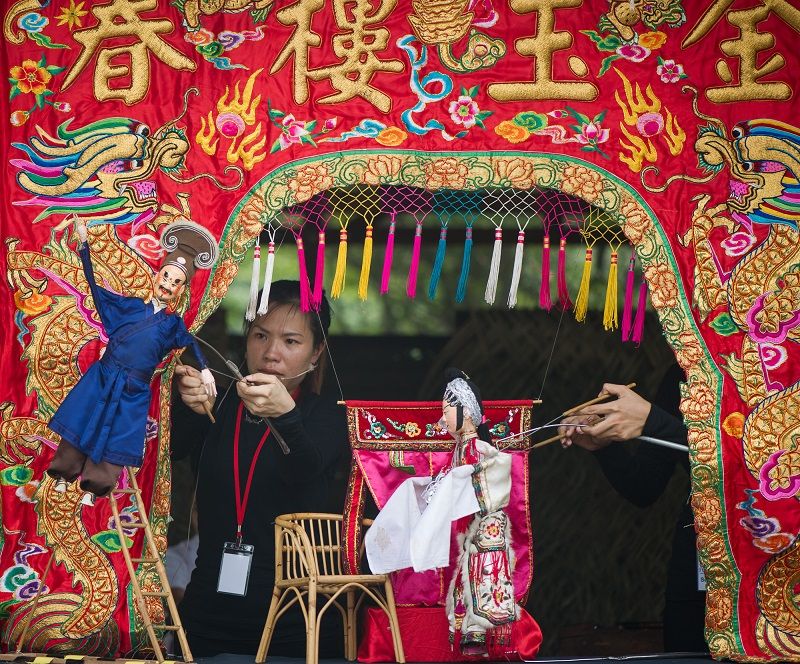 Ling Goh, who leads Penang's Kim Giak Low Choon Teochew Puppetry Troupe, is preserving and continuing the art form for future generations. – Pic courtesy of Pusaka, February 23, 2016.Standing at just over one feet tall, a cast of puppets with intricate costumes and delicate faces move around a small stage with a combination of grace and dramatic flair, performing a Chinese opera in miniature.
Ling Goh, who leads Penang's Kim Giak Low Choon Teochew Puppetry Troupe, is preserving and continuing the art form for future generations. – Pic courtesy of Pusaka, February 23, 2016.Standing at just over one feet tall, a cast of puppets with intricate costumes and delicate faces move around a small stage with a combination of grace and dramatic flair, performing a Chinese opera in miniature.
At the expert hands of Ling Goh and Penang's Kim Giak Low Choon Teochew Puppetry Troupe, the puppets seemed almost lifelike as they staged an old tale called “The Love of the Celestial Fox” at a packed one-night-only show organised by non-goverment organisation, Pusaka, in KL last Sunday.
The opera tells the story of a shape-shifting fox who falls in love with a mortal man and the ensuing drama and comedy.
“There are a lot of similarities between Teochew puppetry and opera in terms of its singing, acting and music,” said Goh at a short talk before the evening performance. She leads the last remaining puppetry troupe of the tradition in Penang.
“We also perform the same stories from oral traditions in China like myth, legend and folktales.”
Evolving from shadow puppetry in China, Teochew puppetry made its way to Malaysia from the eastern Guangdong region over a hundred years ago with Chinese travellers.
But unlike its predecessor where puppets are controlled from below, Teochew puppetry makes use of three metal rods attached to the back of the dolls to create movement.
Goh comes from a long line of Chinese opera and Teochew puppetry performers. Her mother, who is now the percussionist in her troupe, learned the art from her grandmother who learnt it from her mother before her.
“Up until my mother's generation, it was a fully oral tradition. The practitioners used to memorise the scripts and improvise the performance,” she said, adding that now there is a drive to put the art of Teochew puppetry down in writing.
Goh is the fourth generation to continue the tradition having picked up the art form at the tender age of seven.
“It was never really a difficult process because I was passionate about it.
“But probably the most challenging thing for me was learning how to use the three metal rods to produce fluid movement,” she said.
The puppets are all handcrafted with wood, strings and wires, with a head made of clay. Each doll weighs several kilogrammes. Most of the puppets that Goh and her troupe uses are passed down through the family.
Boasting over 60 stories in their repertoire, each performance usually relies on a few stock characters like the hero, maiden, jester, villain and sage. A puppeteer is responsible for up to four characters unlike Chinese opera actors who are only in charge of one.
“The sign of a master puppeteer is to be able to switch voices with ease and sound like they're coming from different people,” said Goh, who has mastered four different roles.
While Goh is a practitioner of Teochew puppetry, she is actually Hokkien (her maternal grandmother was Teochew). But for her, dialect has no bearing on what she does as it's in her blood.
“This is what I know, this is what I do and this is how I feed my family,” she said.
However, she admits that less and less people are interested in watching and learning about Teochew puppetry.
“Sometimes we perform to an empty audience but my mother taught me to do my best regardless, because if you give your best, you'll feel good too.”
Goh's troupe receives no funding although they are supported by Teochew associations in Penang. Apart from performing once a month at the Teochew Puppet and Opera House, they organise classes and workshops teaching singing, basic movements and puppet-making.
They also perform all over the country when they are invited for festivals.
“The younger generation think that our performances are for ghosts during the Hungry Ghost Festival or gods.
“If we can cultivate an interest for the art form in them, then we may be able to support ourselves with our shows like we used to,” Goh said.
“If we don't continue then it will be sad that they will miss out on enjoying things like this and it will just die out.” – February 23, 2016.

Comments
Please refrain from nicknames or comments of a racist, sexist, personal, vulgar or derogatory nature, or you may risk being blocked from commenting in our website. We encourage commenters to use their real names as their username. As comments are moderated, they may not appear immediately or even on the same day you posted them. We also reserve the right to delete off-topic comments